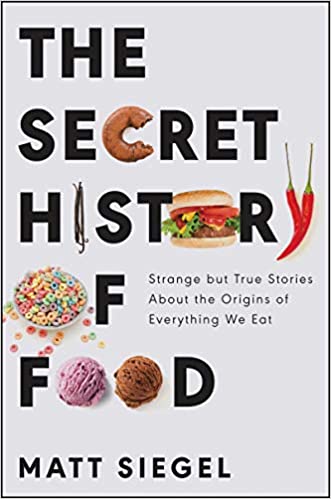You have /5 articles left.
Sign up for a free account or log in.
 The Secret History of Food: Strange but True Stories About the Origins of Everything We Eat by Matt Siegel
The Secret History of Food: Strange but True Stories About the Origins of Everything We Eat by Matt Siegel
Published in August 2021
What is the connection between academia and food? Universities and restaurants? Professors and chefs?
Not sure. But it feels as if there is some association -- a kinship, maybe -- across these two worlds.
Knowing that a significant portion of academics are interested in food-related topics makes me confident that many of you will immensely enjoy reading The Secret History of Food.
The book's author was previously a professor (before leaving academia for the greener pastures of food journalism), a sort of alt-ac career journey that is new to me.
The Secret History of Food is not one of those food books that will make you feel bad about everything you eat. You will not finish this book and immediately swear off factory food, processed food or fast food.
Instead, this book about food will enable the reader to sound more erudite to family and friends on food-related topics than they are in reality. (At least, that has been my experience.)
The book is composed of concise, fact-filled and amusing essays on topics ranging from the history of pie, the historical fears of eating tomatoes and potatoes, and the origins and pleasures of vanilla.
I had no idea that vanilla comes from orchids (an edible fruit!), is named for part of the female anatomy and must be pollinated by hand. Part of my vanilla ignorance is that likely all the vanilla I've ever consumed is artificial. Ninety-nine percent of all vanilla flavoring is not the real thing, but derived from substances such as wood pulp. Likely the reason that I'll never eat natural vanilla is that it is the world's second most expensive spice. (Making me doubt that I've ever actually consumed real saffron.)
The Secret History of Food is full of stories like the origins and uses of vanilla. (And I'll never compare something plain, basic and boring again to vanilla.)
Want to learn why the food system would collapse without corn or how ice cream was classified as an essential food by the U.S. government? Then read The Secret History of Food.
You will impress your colleagues during shared campus meals with your vast knowledge of honey and peppers, assuming that campus food events will return one day.
Thinking about how I might tempt you with The Secret History of Food got me thinking about other food and restaurant books I've read over the years. Below is a list of my food-related book reviews, with an invitation to share your favorite food and restaurant books.
- The Secret Life of Groceries: The Dark Miracle of the American Supermarket by Benjamin Lorr
- The Restaurant: A 2,000-Year History of Dining Out by William Sitwell
- The Fate of Food: What We'll Eat in a Bigger, Hotter, Smarter World by Amanda Little
- Food Routes: Growing Bananas in Iceland and Other Tales From the Logistics of Eating by Robyn Metcalfe
- Hotbox: Inside Catering, the Food World's Riskiest Business by Matt Lee and Ted Lee
- The Way We Eat Now: How the Food Revolution Has Transformed Our Lives, Our Bodies, and Our World by Bee Wilson
- Milk!: A 10,000-Year Food Fracas by Mark Kurlansky
- Grocery: The Buying and Selling of Food in America by Michael Ruhlman
- How Caffeine Created the Modern World by Michael Pollan
- Sugar, The World Corrupted: From Slavery to Obesity by James Walvin
- Coffee for One: How the New Way to Make Your Morning Brew Became a Tempest in a Coffee Pod by KJ Fallon
- Blood, Bones & Butter: The Inadvertent Education of a Reluctant Chef by Gabrielle Hamilton
- Sweetbitter: A Novel by Stephanie Danler
- Back of the House: The Secret Life of a Restaurant by Scott Haas
Other restaurant and food books that you might recommend?
What are you reading?




